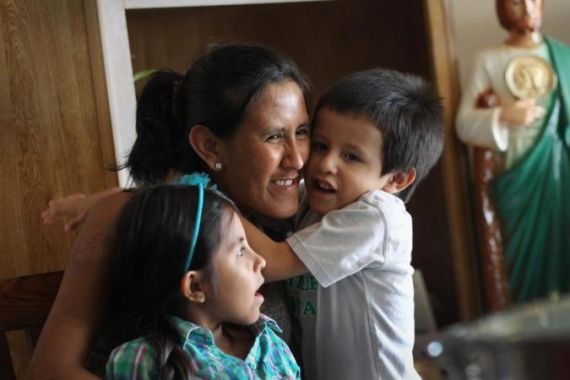Immigration of unaccompanied minors on rise
The surge in child immigration is primarily the result of escalating gang violence, particularly in Central America.

At the age of 12, Aaron dropped out of school in Guatemala to help support his family. He took a job at a farm, where he laboured tirelessly for more than 12 hours a day. Like many youth, he was soon targeted by a gang. Bullied and attacked, he fled to the United States seeking protection.
Aaron is one of a growing number of children who are leaving home alone in search of a better life. Although immigration to the US is at a record low, the number of unaccompanied minors seeking entry is at an all-time high. In 2008, US Border Patrol apprehended roughly 8,000 unaccompanied minors at the border. By 2012, that number ballooned to nearly 25,000.
While children from contiguous countries like Mexico and Canada are, in most cases, quickly sent home, last year alone almost 14,000 children were taken into federal custody for deportation proceedings. The majority do not have a lawyer. Because immigration hearings are civil and not criminal, immigrants are not entitled to counsel under the US Constitution.
Congress may soon fill this void. A bipartisan immigration bill recently unveiled in the US Senate mandates that unaccompanied minors be provided counsel by the US Department of Justice. However, the bill is already under attack, and will be amended and renegotiated. Yet, this provision must endure.
Otherwise, children will continue to face the impossible task of confronting immigration judges alone and defeating government attorneys bent on deporting them. Without legal assistance, some are sent home to endure the very same perilous conditions that prompted them to flee.
Many are the victims of domestic violence and human trafficking; some live or work in the streets, often as vendors and entertainers; and still others seek reunification with family members living in the US.
Yet, the surge in child immigration is primarily the result of escalating gang violence, particularly in Central America. El Salvador, for example, a nation with just 6 million people, has become a haven for hundreds of gangs totalling 64,000 members. Poor employment prospects, rising poverty and weak gun laws, have made children ripe for recruitment. For many, refusal is not an option.
|
US immigration system moves towards reform |
Recognising the vulnerabilities of unaccompanied minors, the US government mandated years ago that they be segregated from other detainees and resettled with relatives or guardians pending the outcome of their case.
Yet, the government still won’t provide them counsel. Kids in Need of Defense, a Washington, DC, based non-profit, has strived valiantly to find these children pro-bono representation. But they simply cannot keep up.
It is as farcical as it is shameful. Many cannot speak English but are forced to navigate a labyrinth of immigration laws that sometimes befuddle even the sharpest of legal advocates. Many have never entered a courtroom but must adhere to complex court procedures and arcane rules of evidence. Many are the victims of unspeakable persecution but face daunting authorities like immigration judges and government attorneys, looking to expedite or refute their case.
What’s more, many of these kids have meritorious defences protecting them from deportation. According to the Vera Institute of Justice, as many as 40 percent of these children may be eligible to stay in the US. Some are entitled to asylum because they have a genuine fear of persecution in their home country. Others are eligible for protection because they are the victims of human trafficking or parental abuse.
Their cases, however, are not always easy. Unlike race, religion, or nationality, for example, children are not considered a protected class under US asylum law, and must therefore prove membership in a cognizable social group. Yet, courts are sometimes hesitant to extend asylum protections on this basis, and often undercut claims made by street children and gang victims. Moreover, immigration judges are precluded from considering the best interests of the child in deciding cases, and instead must apply black-letter law even if it means putting a child in harm’s way. This stands in stark contrast to custody disputes where the best interests of the child reigns triumphant. These legal oddities make the need for counsel particularly acute.
Indeed studies show that access to counsel may be more important than the facts of the case. Asylum applicants represented by counsel are three times more likely to win their cases than those without. And, in immigration cases generally, those assisted by counsel are five times more likely to prevail than those who appear pro se.
Washington cannot seem to agree on much these days. But can’t we agree on the world’s most vulnerable? No immigration bill will be complete; no immigration bill can possibly benefit a nation committed to due process, without affording children in immigration court the right to counsel.
Arjun Sethi is a lawyer in Washington, DC, and a frequent commentator on civil rights and social justice-related issues. He has written for the Washington Post, USA Today and CNN, among other publications.
Follow him on Twitter: @arjunsethi81
